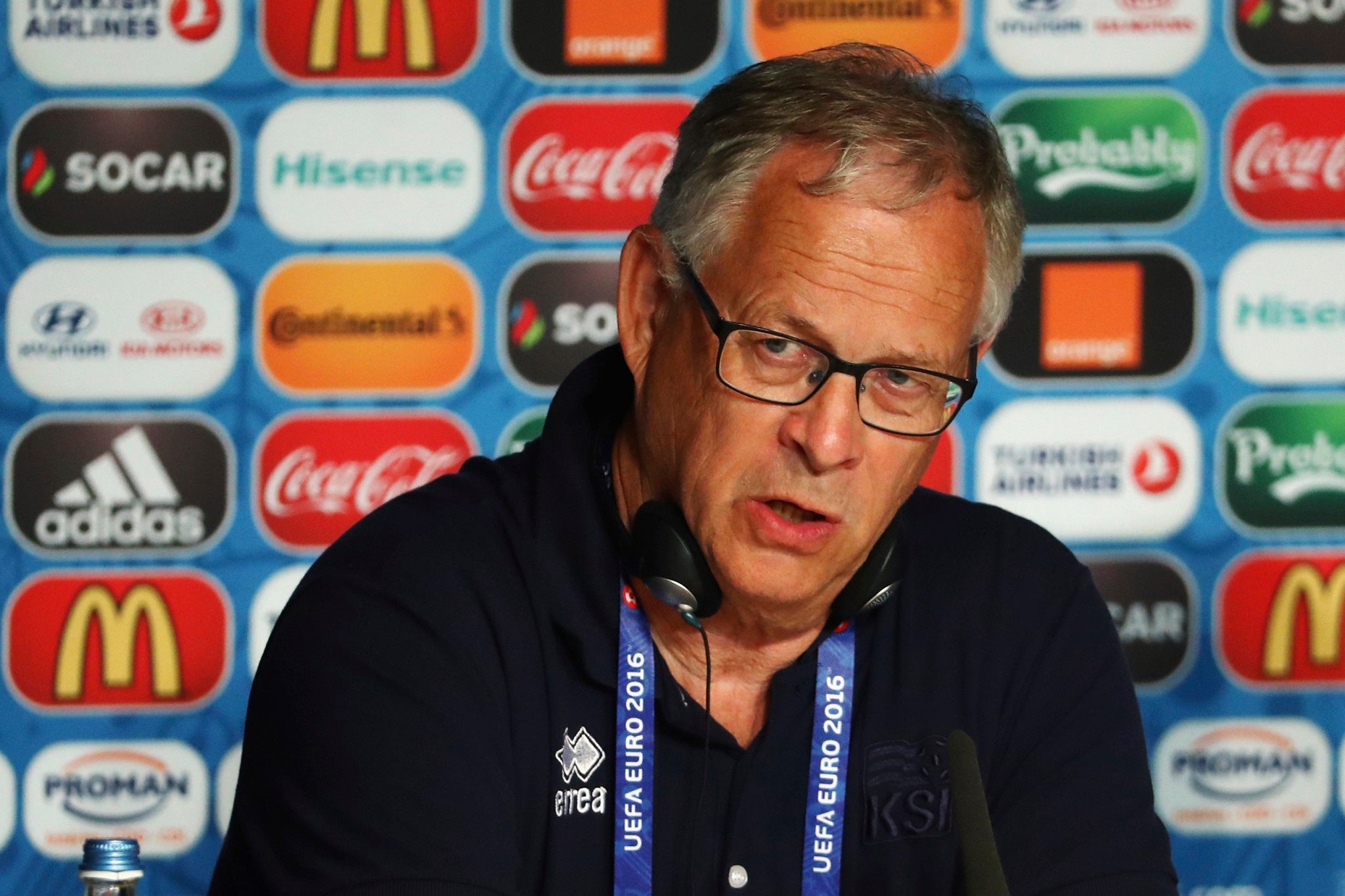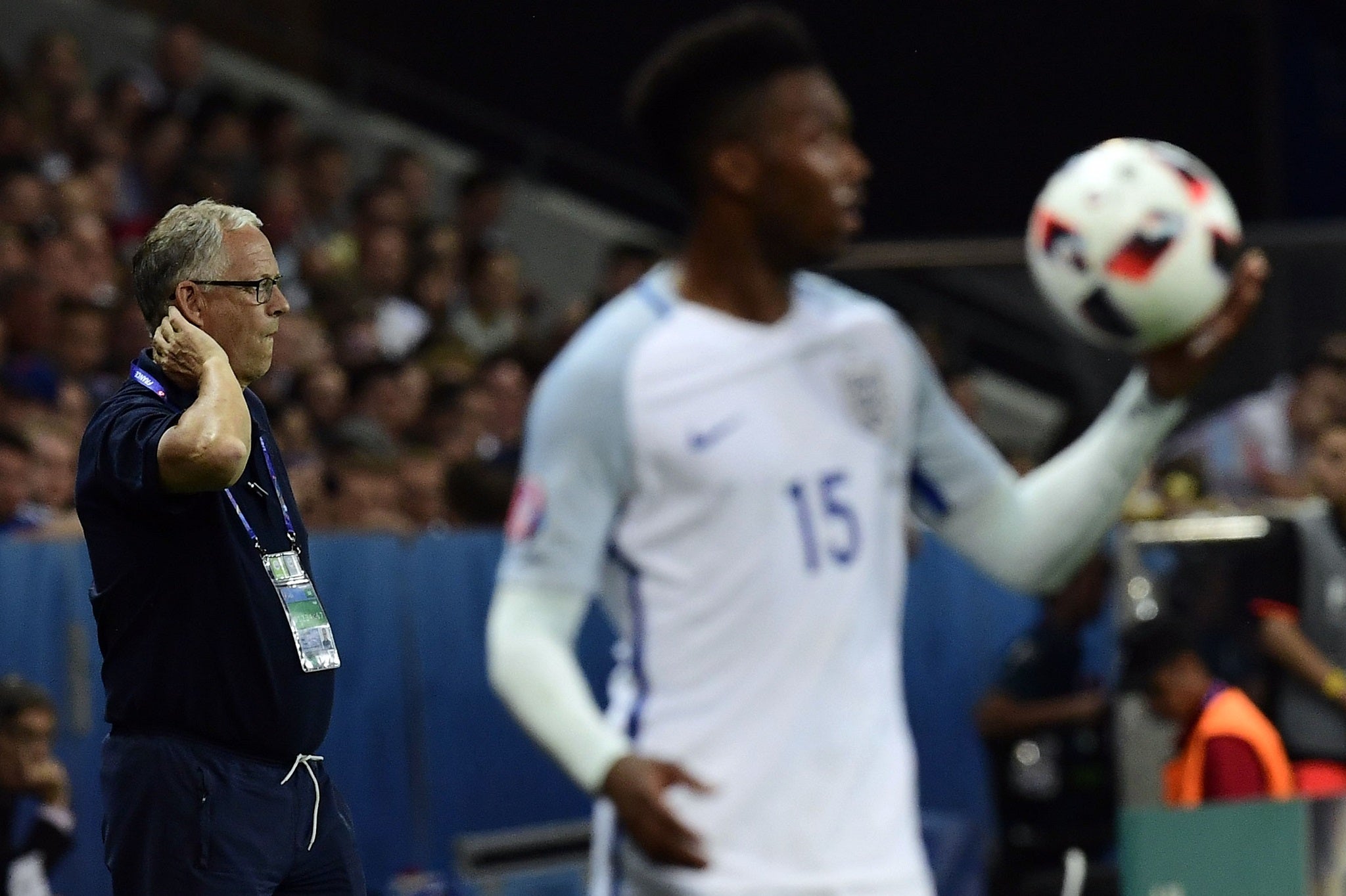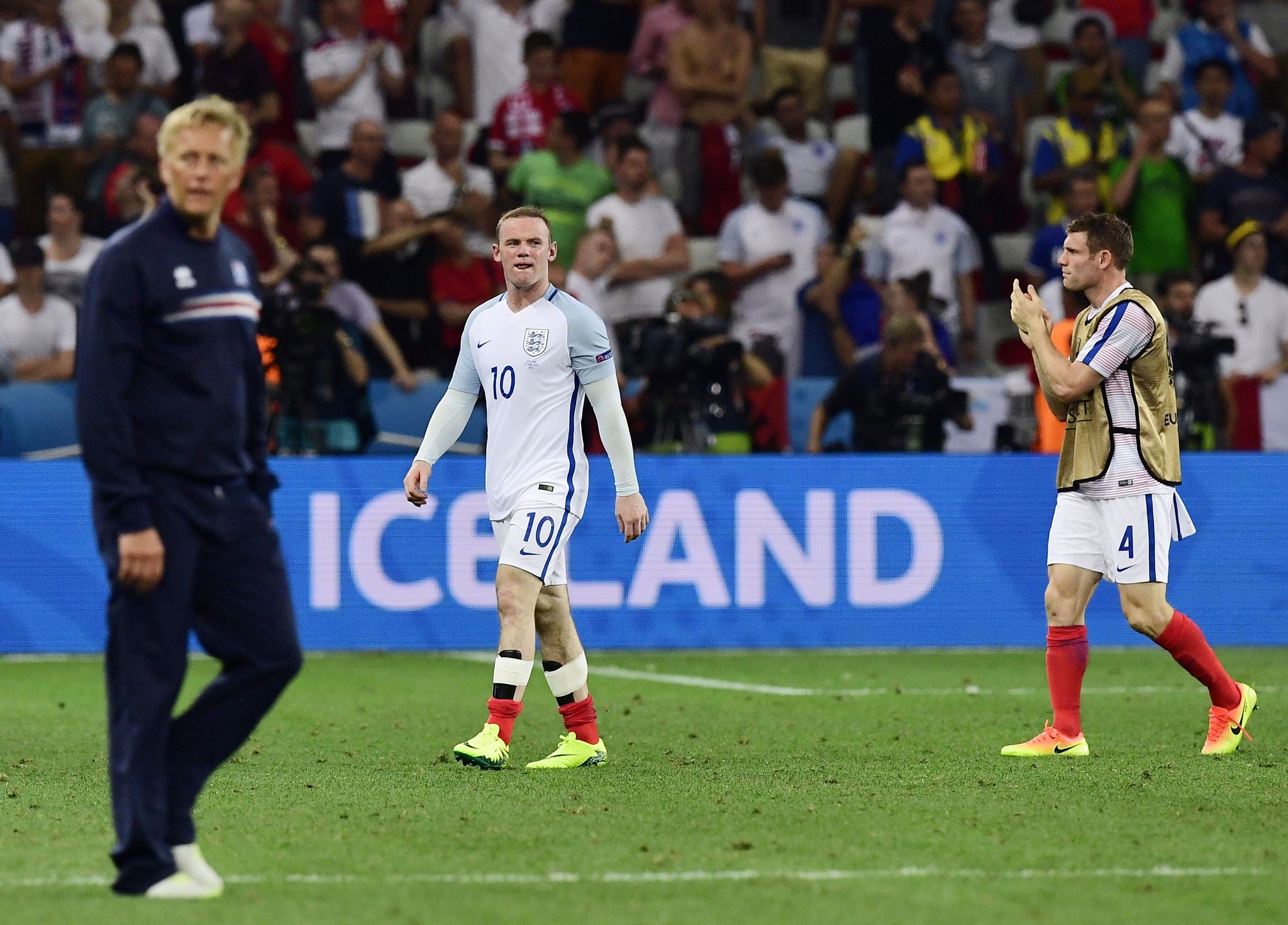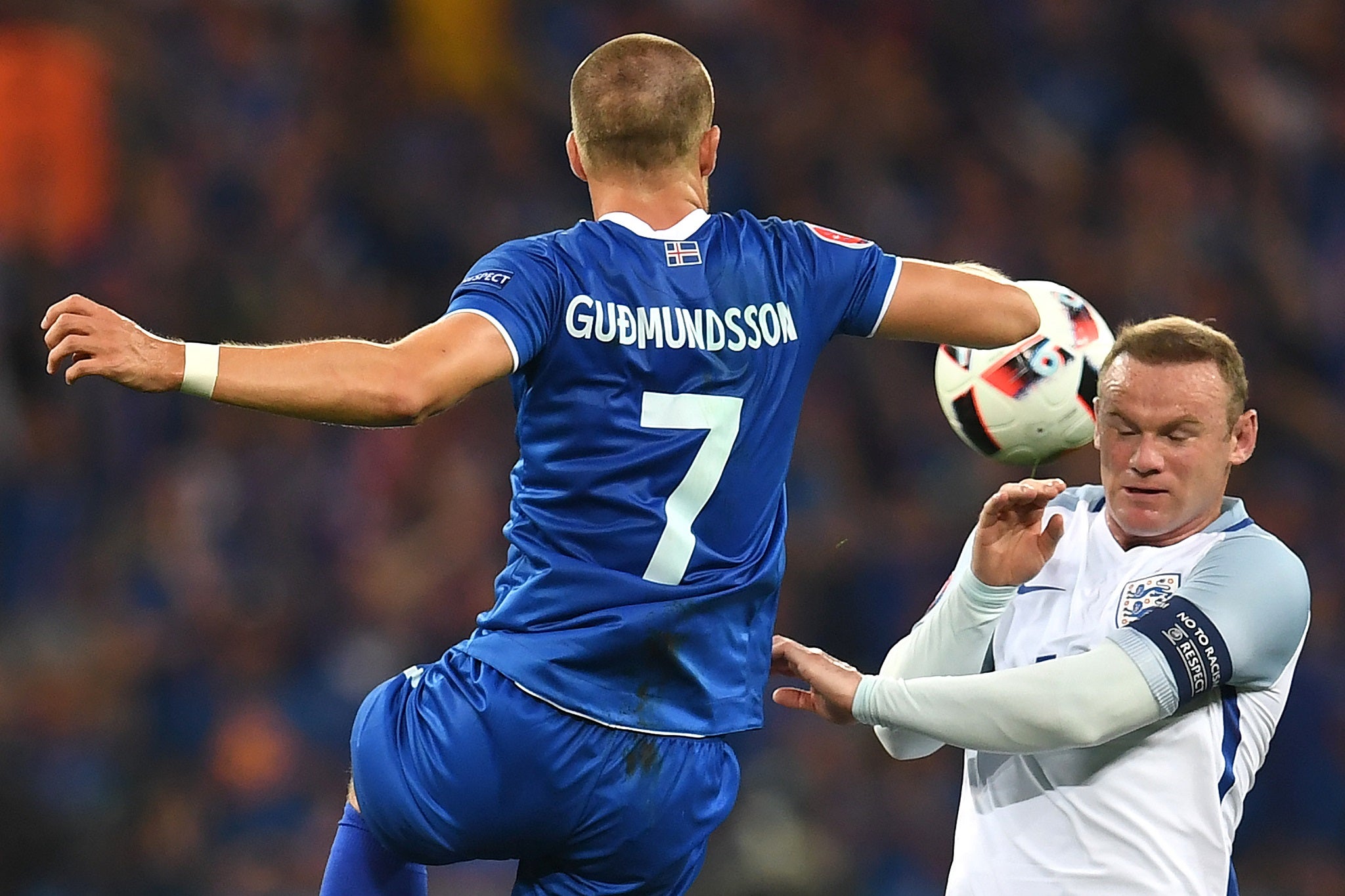England vs Scotland: Why the Three Lions fell short at Euro 2016, according to ex-Iceland manager Lars Lagerback
Lars Lagerback was the man behind England's downfall at Euro 2016, and he tell Simon Hart why problems in the Premier League and their diminsing influence were the cause of their early exit

It was probably his finest hour as a football manager but as Lars Lagerback looks back on Iceland’s Euro 2016 victory over England, there is one aspect of that stunning underdog triumph that still sits uneasily with him – the impact it had on his old friend Roy Hodgson.
“I really feel for him because he’s had a marvellous career as a coach,” says Lagerback of the former England manager, whom he first met during Hodgson’s days coaching in Sweden in the 70s. “To almost kill a person because you lose one game in football, it’s a ridiculous world we are working in from that perspective.”
And have they spoken since that night in Nice? “We spoke very briefly after the game. I didn’t want to interfere too much. I could easily understand how he felt. Afterwards I tried to find out where he was going but I couldn’t find him. After time had passed, I haven’t tried to reach him after that, so we haven’t spoken.”
Lagerback is speaking to The Independent from his home in Stockholm, ahead of his return to the country where Iceland wrote one of modern football’s great Cinderella stories. The 68-year-old is now acting as adviser to Sweden national coach Janne Andersson and Friday brings a World Cup qualifier at the Stade de France, where Iceland’s Euro adventure was finally ended by the hosts last summer.
It is bound to stir memories for Lagerback – “the journey with Iceland has been special,” he says – and no moment was more special than when the final whistle sounded on their round of 16 tie in Nice on 27 June. So much has been said and written about England’s demise that night and five months on, it is fascinating hearing Lagerback’s impressions of the team he helped to humiliate. He gets straight to the point. “Mentally that wasn’t the normal England I played,” he says.
If this tallies with FA CEO Martin Glenn’s subsequent description of England as “brittle”, Lagerback adds that he saw little to fear from an England team who, despite their transformation into a possession team, carried little of the threat of old. “We didn’t fear them so much, not as before when they’d attack us with longer balls or a lot of deep runs,” says Lagerback who had previously faced England five times as Sweden coach. “From a football point of view when we played England in the first part of my time it was always a physical battle especially the game in ’99.” That was a particularly feisty Euro 2000 qualifier in 1999 in which Paul Scholes was sent off.

Nice, as Lagerback recollects, “was different”. He explains: “They looked very passive. I’d like to think a big part of that was because Iceland played really well and the way we defended. The longer the game went on, they lost focus and you couldn’t see any clear ideas about what they wanted to do, and this was growing more and more after we scored the second goal.”
For Lagerback, watching from the Iceland bench, this was where England lack experienced players with leadership qualities. “Players like Dele Alli have big potential but they haven’t the experience or haven’t matured that much so if the team aren’t winning, these young players are not the ones to take the lead or put a mark on the game. I’m speculating because I don’t know the players, but it looked a bit like that. You didn’t have a player who took the lead in the England team after we’d scored the second goal.”
Not a single player? “No, I didn’t think so. They’re really good players when you look at them individually and they kept trying but you couldn’t see anyone stepping forward mentally or physically in the way they were playing. I think we controlled the game very well at 2-1. In the end they had some half-chances but they didn’t get any totally open situations to score, even if they started to play more direct. We controlled it so I couldn’t see anyone that really stepped forward as a leader.”

Lagerback has a proud unbeaten record from six matches as a coach against England and he admits his message beforehand was that Hodgson’s side were overrated. “Of course you use some clichés – like saying England are often overestimated. I can’t say I meant it 100 per cent but you try to send the players out there feeling, ‘We can really beat this team’.”
It helped, he explains, that players in Iceland, as in Sweden, know so much already about English football. “If you know them, it creates a kind of security mentally for the player.”
The importance of the mental side of international football cannot be overstated, according to Lagerback, who has spent “more and more time” in his career speaking to his players both individually and in group sessions about this aspect. This leads to the question of England and the burden of expectation that our players must handle.

He responds by citing the lack of opportunities some of these players have with their clubs in the Premier League. “I don’t have statistics but in Germany they have a lot of players playing in the top clubs. If you go to the top English clubs in some teams you see nine or ten starting players from other countries. Maybe the expectation, if you look at it from that side, is too high for England. But at least the quarter-final is a realistic expectation for an England national team in my opinion.”
Of course, if England’s Euro hangover has not entirely cleared – hardly helped by the subsequent Sam Allardyce saga – the Scotland team they face on Friday are even less sure of themselves. Scotland have not qualified for a major tournament since France 98 and have already seen their hopes in this campaign dented by last month’s home draw with Lithuania and 3-0 defeat in Slovakia. Lagerback has some sympathy for Scotland whose players, he believes, are suffering from a similar lack of opportunity as their Swedish counterparts.

“One reason is the same as in Sweden – if you go back to the 90s when Sweden played Scotland they had more players in the big leagues especially in the Premier League at the better clubs. After the Bosman ruling I would guess Scotland has much fewer players playing in the better clubs in bigger countries and it is the same with Sweden.”
Yet Sweden (population: 9.5m) continue to make it to major finals, whereas Scotland (population: 5.3m) do not. And just look at what Iceland (population: 330,000) managed last summer. So just what is the key to getting the best out of one of international football’s smaller nations?
“I try to call myself a realistic optimist,” Lagerback says. “You have to do a very realistic analysis of what you have and look for the strength that the team you’re playing against has and then try to find your way of playing. That’s the only chance. If you just try to copy another team who has other skills or better skills you’ll probably lose.
“For a long time many coaches have looked at Barcelona and Spain, and often in Europe they talk about possession football and of course that’s a nice way of playing football but if you don’t have the best players you have to find another way.
“For me with a small country – and I suppose it’s a little similar in Scotland – you need to have a really well organised team and they have to work hard for each other and if you do that you always have a chance to win. I also think when you don’t have the best players individually too many managers today look to the 45 seconds when the player has the ball. Football is 89 minutes without the ball for every player.”

With Iceland, a key aspect was using set-pieces well. “We scored around 50 per cent of our goals on set-plays. A lot of coaches underestimate that part of the game today.”
This takes us back to Nice, where England were caught out for Iceland’s equalising goal by a long throw by Aron Gunnarsson. “I don’t know if they spotted that from their scouts but we started the Euro using one target for the long throw-ins and then we built it up to two,” explains Lagerback, who still seems surprised that “England put Rooney on to mark our central defender [Kari Arnason] who assisted the long throw to the other central defender [Ragnar Sigurdsson]. What is Rooney, 1.76m?”
Experience has told Lagerback that these little details count and given his unbeaten record against England, it seems a surprise he was never offered a job here. “When I was younger if someone had asked me and I thought it was interesting, I’d have loved to go to England,” says the Swede, who got no closer than an interview for the Wales job in 2010, prior to the appointment of Gary Speed. “The Welsh FA chose him and I have a lot of respect for that. He was Welsh and I think it’s a good principle to try to find domestic coaches.”
And would he not fancy one last hurrah in the English game today? There is a chuckle at the other end of the line. “I am really over the hill,” he replies, his grasp of English idioms right up there with his understanding of our footballers’ weak spots.
Join our commenting forum
Join thought-provoking conversations, follow other Independent readers and see their replies
Comments
Bookmark popover
Removed from bookmarks